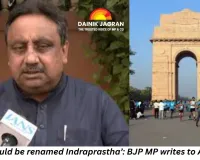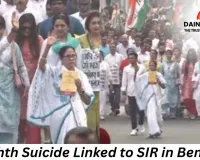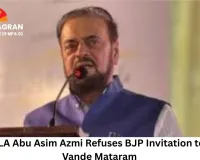SIR Faces Political Storm: DMK Moves Supreme Court
Digital Desk

The Election Commission’s Special Intensive Revision (SIR) of electoral rolls—an extensive voter list verification exercise—has triggered a political storm across India, with opposition-ruled states challenging its legality and intent. As the second phase of the exercise began on Tuesday across nine states and three Union Territories, Tamil Nadu’s DMK approached the Supreme Court, while West Bengal Chief Minister Mamata Banerjee led a street protest in Kolkata, accusing the Centre of manipulating voter lists through the Election Commission.
The SIR, last conducted nationwide in 2004, aims to update electoral rolls by removing ineligible names—such as deceased persons, duplicates, and those who have relocated—and adding eligible new voters. The exercise covers Tamil Nadu, Kerala, West Bengal, Uttar Pradesh, Madhya Pradesh, Rajasthan, Chhattisgarh, Goa, and Gujarat, along with Puducherry, Andaman and Nicobar Islands, and Lakshadweep.
According to the Election Commission, the revision is essential to ensure “free and fair elections” by cleaning up outdated voter lists after two decades of demographic shifts and migration. The Commission has stated that Booth Level Officers will conduct door-to-door verification until February 2026, adding that the process will follow due transparency and verification mechanisms.
However, opposition parties have alleged that the timing and method of the revision are politically motivated, particularly in states headed for elections next year. In Tamil Nadu, the DMK-led government filed a writ petition in the Supreme Court calling the SIR “unconstitutional and arbitrary,” warning that it could disenfranchise genuine voters. Chief Minister M.K. Stalin, who chaired a multi-party meeting with 44 parties, described the exercise as “anti-democratic” and aimed at manipulating voter lists ahead of the 2026 Assembly elections.
In West Bengal, Mamata Banerjee led a 3.8-kilometre protest march in central Kolkata, joined by TMC leaders and workers, charging that the revision was being carried out under BJP pressure. “This SIR is not about transparency—it’s about removing the names of minorities and poor voters,” a TMC spokesperson said.
Kerala Chief Minister Pinarayi Vijayan also criticised the EC’s move, saying the decision to base revisions on voter lists from 2002–2004 instead of the latest rolls violates the Representation of the People Act, 1950, and the Registration of Electors Rules, 1960. He termed it a “serious challenge to the democratic process.”
Opposition leaders, including from Congress, CPI(M), and RJD, fear large-scale deletion of names due to the tight verification timeline, which may prevent migrant workers and tribals from confirming their entries. The Congress in Madhya Pradesh highlighted that nearly 40–50 lakh seasonal migrants risk losing their voting rights.
The Election Commission has dismissed allegations of bias, saying the SIR is a routine and transparent exercise necessary for maintaining electoral integrity. Yet, the controversy has deepened with fresh petitions and protests, transforming a technical revision process into a politically charged national debate over voter rights and institutional credibility ahead of key state elections in 2026.











